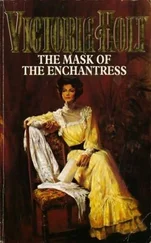‘Madame, I am indeed. And you knew this when you sent for me.’
‘Jesuit!’ cried the Marquise. ‘You are gloating in your power over me . . . or what you imagine is your power. Your Society wish for nothing more than to see me leave Court. Now let me tell you something, Monsieur Jesuit: I shall never leave Court of my free will. Only would I leave to please His Majesty; never would I go in order to serve the purpose of the Society of Jesus. You forget that I have as much power at Court – nay more – than you and your Society. While that is so you are foolish to think to dictate to me.’
‘Madame, I merely told you the price of salvation.’
‘And I merely tell you to leave my presence at once.’
Père de Sacy retired immediately; and when he had gone the good sense of the Marquise overcome her anger.
Why lose her temper with the man? All she had to do was send for a priest who would hear her confess and give her pardon without naming his conditions.
This was not difficult to do.
The Marquise publicised her conversion by erecting a gallery in that convent which was the resort of fashionable penitents: the Capucines in the Place Vendôme.
Maria Theresa now felt that her conscience no longer stood between her and Madame de Pompadour. She was at liberty to negotiate with the lady whom all knew to be, although not in name, the First Minister of France.
* * *
Maria Theresa signed the first Treaty of Versailles in May of 1756. Frederick of Prussia meanwhile had signed a treaty with George II against France. Thus war on two fronts was threatening France who was already at war with England. Then Frederick invaded Saxony without warning – a direct attack on Maria Theresa.
The powers of Europe were lining up for a major conflict. The Seven Years War had begun.
* * *
The Dauphine was an unhappy woman during those days.
Her father had become a victim of war and, at the approach of Frederick’s armies, had escaped to Warsaw, leaving her mother behind in Dresden to negotiate with the envoys of the King of Prussia.
This was a bitter blow indeed to Marie-Josèphe; but one which hurt her more had fallen upon her.
She believed she must have been the last one at Court to learn of her husband’s infidelity. That knowledge did nothing to alleviate her sorrow.
That which she had always feared had happened. He loved someone else, really loved her, not because she had been forced upon him, not because she had determined to do her duty, but simply because she so charmed him that there was no help for it.
The Dauphin was in turn melancholy and truculent.
Sometimes he was so tender, calling her his dear little Marie-Josèphe, recalling the time when she had braved death or disfigurement to nurse him through a dangerous illness. Then she had to leave him as quickly as possible, for she feared she would burst into tears and implore him to give up this woman.
At other times he would strut about her apartment, almost as though it was no concern of his that she suffered, rather indeed that he thought her a fool to suffer, not to understand that every man must have his mistress.
Her women shook their heads philosophically. The Dauphin had been faithful so far, and that had been quite remarkable. How many women did she know with husbands who in the course of many years took only one mistress! they implied.
One is as hard to bear as ten would have been, she thought; perhaps harder. If he had been as his father, I should have become accustomed to his infidelities.
The Queen, realising what was happening, took to spending more time with her daughter-in-law.
She herself remembered too well those days when she had first discovered the King’s infatuation for Madame de Mailly.
Poor little Marie-Josèphe suffered even as Marie Leczinska had done.
The Queen would dismiss her women when her daughter-in-law came to her; she would make the Dauphine sit at her feet and lean her head against her lap while she stroked the young woman’s hair.
‘Weep if you wish, my daughter,’ said the Queen to her one day. ‘There is no one to see you but myself. It is good to weep sometimes. It cleanses the mind of bitterness.’
So the Dauphine sobbed until she was exhausted; then she sat quietly at the feet of the Queen.
‘It will pass,’ said Marie Leczinska. ‘It always passes.’
‘I did not think it would ever happen . . . to us. We were different.’
‘We are all different, or so we think until we make the discovery that we are all alike. You are as I was, my daughter. The Dauphin is as his father.’
‘With the King there are so many.’
‘In his youth he might have been called a faithful man. It was only later that there began to be so many.’
‘You mean that my Louis will be . . .’
‘Who knows, child? It is well to be prepared for any eventuality.’
‘I think I should die.’
‘You would live, as I have lived.’
‘You Majesty gives me great comfort.’
‘Perhaps you comfort me . My grief was so like yours. But weep no more, for it is useless to weep. Queens . . . Dauphines . . . they learn to accept what is thrust on them, you know.’
‘I know, Your Majesty.’
‘When he comes to you, you must give no sign of resentment. You will remain his friend, and if you are wise, you need not lose his affection.’
‘You do not understand,’ cried the Dauphine vehemently. ‘It was once a perfect thing, and now it is . . . besmirched.’
‘But give no sign of your resentment, my child. Take my advice. Had I been a wiser woman I might have been a happier one. I will show you something. This day I had a letter from the King. All our communications are by letter. He no longer cares to converse with me.’ The Queen’s voice trembled slightly. ‘But this letter . . . shall I tell you what it contains? It is a request from the King that I make a certain lady one of my dames du palais .’
‘And this lady is?’
‘Madame de Pompadour of course. You see it is not enough that he honours her on every occasion; I also must do so.’
Marie-Josèphe had sprung to her feet. ‘I would not do it. If he were to bring that woman to me . . .’
‘Let me tell you how I answered this request, my child.’
‘Yes, Your Majesty.’
‘I wrote to my husband that I had a King in Heaven from whom I drew strength to endure my burdens, and that I had a King on earth to whom I should always offer obedience.’
The Dauphine clenched her fists and cried: ‘You do not love him as I love the Dauphin.’
‘My dear child, calm yourself,’ answered the Queen. ‘In time you will learn forbearance . . . even as I have. You will understand that women like us are born to endure without complaint.’
Then the Dauphine fell to her knees and in silence buried her face in the Queen’s lap.
Marie Leczinska smiled sadly as she laid her hand tenderly on the head of her daughter-in-law.
* * *
The people were bewildered. The French at war, and the Austrians were their allies! Such a reversal of policy could not easily be understood, for the Austrians had been their enemies for a long time and they did not trust them.
France was committed to a war in their colonies and war in Europe, and wars meant taxation. They did not want war; they wanted bread.
Moreover Madame de Pompadour had been made a dame du palais in the Queen’s household and was parading her piety before the world. They did not trust Madame de Pompadour; they did not respect the King.
Madame de Pompadour was the First Minister of France, it was said; and France was now engaged in a bitter struggle on two fronts.
Читать дальше








